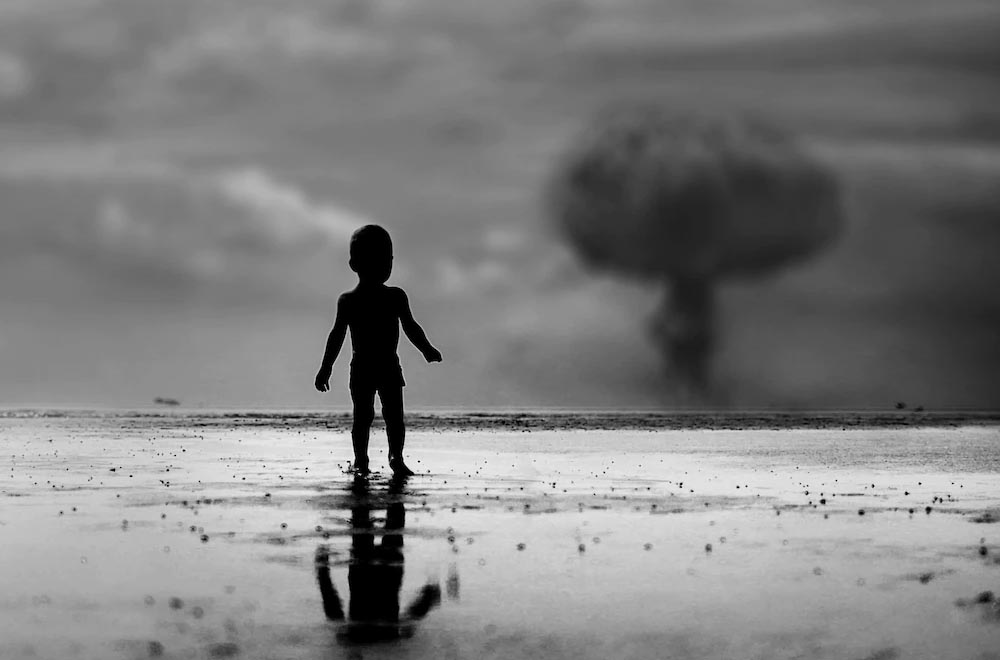Download (PDF, 5.4MB)
INTRODUCTION
Can humans really claim to be wise?
Humans, in their arrogance, call themselves not just “Homo sapiens”, but “Homo sapiens sapiens”, the “wisest of the wise”! Admittedly, our species has enormous technical and scientific progress to its credit, as well as great cultural achievements. But wisdom? Wisdom is another matter entirely. Our suicidal wars against nature and against each other can hardly be called wise.
The insanity of nuclear war
War was always madness, always immoral, always the cause of unspeakable suffering, economic waste and widespread destruction, and always a source of poverty, hate, barbarism and endless cycles of revenge and counter-revenge. It has always been a crime for soldiers to kill people, just as it is a crime for murderers in civil society to kill people. No flag has ever been wide enough to cover up atrocities.
But today, the development of all-destroying thermonuclear weapons has put war completely beyond the bounds of sanity and elementary humanity.
Just as the leaders who started World War I had no imaginative idea of what it would be like, so our current leaders seem not to understand what a war with thermonuclear weapons would be like. During the Cold War, driven by collective paranoia, enough nuclear weapons were produced to destroy human civilization entirely, together with much of the biosphere. The collective explosive power of these warheads was equivalent to 20,000,000,000 tons of TNT, i.e., 4 tons for every man, woman and child on the planet. Expressed differently, the explosive power of these weapons was roughly a million times greater than the power of the bombs that produced the horrors of Hiroshima and Nagasaki. Today, the existing nuclear weapons have “only” half a million times the power of the bombs that devastated the two Japanese cities. But this does not change the fact that a thermonuclear war would destroy human civilization, together with most of the plants and animals with which we share the gift of life.
Research has shown that fire-storms produced by a nuclear war would send vast quantities of smoke into the atmosphere, blocking sunlight, and blocking the hydrological cycle. The climate would become very cold for a period of about ten years. Human agriculture would fail. Plants and animals would also be killed by the nuclear winter.
Ukraine and the threat of nuclear war
Besides illegally and brutally invading Ukraine, Russia’s Vladimir Putin has put Russian nuclear forces on high alert, thus threatening the world with nuclear war.
Our failure to address the climate emergency
An equally serious lack of wisdom can be seen in the world’s collective failure to adequately address the climate emergency. Recent reports by the International Panel on Climate Change (IPCC) tell us that the situation is very grave indeed. We are close to tipping points, beyond which human efforts to avoid catastrophe may become useless, as feedback loops take over and drive us towards disaster.
The Keeling curve measures the concentration of atmospheric CO2. Despite conferences, speeches, and promises, the Keeling curve keeps steadily rising, and its rate of rising is also increasing.
Sacrificing the earth for the sake of the economy
Humans tend to see what is near to them more clearly than what is far away. The basic problem in mobilizing political will to address the climate emergency is that immediate action is urgently needed, but the worst effects of catastrophic climate change lie in the distant future. What every nation seems to do is to give its economy higher priority than the urgent need to save the earth. If we fail to prevent catastrophic climate change, most of the earth’s surface will become uninhabitable, and the global population of humans will be correspondingly reduced, no doubt with much conflict. Is this wisdom?
We need wisdom before it is too late
Our species urgently needs wisdom to save us from the danger that our arrogance and folly have created. Can we not try to save ourselves by actually becoming Homo sapiens?
Read the entire book above or download it here.
We thank John Scales Avery, a renowned intellectual, EACPE board member, and theoretical chemist at the University of Copenhagen, for giving us permission to reproduce his latest book for EACPE.


